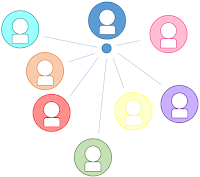 A friend told me about someone who just got a big promotion. Two areas were being combined and he was asked to lead both of them. Priority one was to create his mandate for change, one that he believes will transform the whole company.
A friend told me about someone who just got a big promotion. Two areas were being combined and he was asked to lead both of them. Priority one was to create his mandate for change, one that he believes will transform the whole company. Ambitious leaders like this one usually pour all of their passion, thinking and resources into building their agenda and a plan to deliver it. It's good work that is quickly completed by their team. The output is positively reviewed by their boss and the team that created it, which communicates that change is coming and creates a sense of progress and feeling of momentum.
From a change perspective, what's wrong with this picture? This approach, although positive, lacks an important element required for success: the support and buy-in of peers. Agendas are made up of projects that impact departments or groups outside of the leader's domain, especially the ones that will transform the whole company. If peers in other areas aren't supportive of the projects, the initiative is likely to be ignored, paid lip service to or blocked. All of the passion, thinking and resources invested in the projects fail to produce the promised results.
 A better approach is to gain peer support when starting to plan the agenda. This provides the opportunity to gain input, secure buy-in and avoid people feeling like the projects (and change) is being done to versus with them.
A better approach is to gain peer support when starting to plan the agenda. This provides the opportunity to gain input, secure buy-in and avoid people feeling like the projects (and change) is being done to versus with them.An important truism of change is that people support the work they create. They gladly advocate for and implement their own good work. The goal then is to invite peers to shape your agenda so that it becomes a co-owned initiative. Not doing so can trigger another change truism: people resist things they didn't create, often referred to as the 'not invented here' syndrome.
Here are fifteen ways to gain support from your peers:
- Explain why the project or agenda is needed – for the department and the entire organization
- Meet with each peer to discuss how the project could further his or her agenda – record the answers, measure and provide updates on them (both rational and emotional benefits)
- Establish goals that all peers will benefit from
- Include peers in launch articles or videos articulating why the project is important to them and the organization
- Align project timing so that it doesn't conflict with other major project launches – if there is a conflict colleagues' focus will be diffused and support will be less than needed
- Ask peers for advice on how to build the plan and how to measure success – people ignore metrics they do not value
- Be clear on how they can help the project be successful – e.g. endorse the initiative to their teams, participate on a steering committee, take part in a panel discussion, share resources, etc.
- Thank peers for their support before it is given – they will be more likely to honour them
- Invite peers to assign a representatives to the project to ensure their needs are met
- Secure time on regular cross-area meetings to provide updates on progress
- Personally brief peers face-to-face on changes to the plan that will affect them before they are announced – this is time consuming, but essential; people can handle the truth, but they can't handle surprise
- Communicate successes gained by peer teams as much, if not more, than your own – success breeds engagement
- Attribute successes, in part, to the support provided by peers – it wouldn't have been possible without them, which is true
- Send notes of appreciation to the peer representatives thanking them for their contributions (cced to their managers and area leader)
- Include peers in lessons learned reviews at the end of the project – this will set up support for future projects

Most agendas and projects require cross-functional peer support to be successful. Sharing the design, ownership and success of them with peers will ensure that everyone wins.
Phil

No comments:
Post a Comment